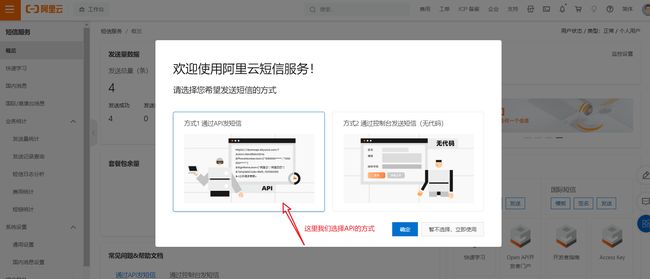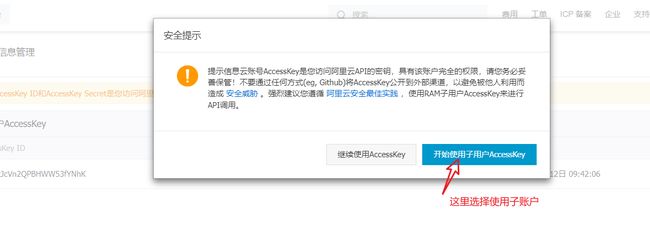SpringBoot实现短信登陆功能
大家好我是小羽,这段时间做项目用到了手机短信登陆的功能,在此记录一下。欢迎大家来关注我的微信公众号Java小羽。
一、注册阿里云账号
- 登陆阿里云,直接用支付宝扫码就可以登陆注册。
- 点击控制台
3.点击侧边栏
4.搜索短信服务
5.选择类型
6.进入短信服务中的快速学习,在这里可以用测试短信,不需要备案审核啥的,方便不少
7.向项目中导入相关Maven依赖
8.因为我们要操作阿里云的API,需要一个密钥,密钥只能给自己看,一旦泄露,相当于拥有你账户的全部权限,(主账户拥有全部权限,就是支付宝登陆的账号),所以要设置一个子账户,并赋予有限的权限,这样即使泄露了,可以将危害程度降低到最低。
9.设置子账户
10.(重点)此时会获取你的AccessKey ID和AccessKey Secret,当前界面只会出现一次,最好下载CSV文件到本地。
11.给子账户授权(若不授权,则没有权限调用任何功能)
出现以下界面,就添加权限完成
二、代码实现
准备工作做完了,可以代码实现了。
1.记得导入Maven的包,不要忘记这一步了,具体步骤上面截图有。
2.编写发送短信的工具类,其实在上述第8部分截图的页面中,官网给了示例代码,我只是将它封装成了一个工具类。
import com.aliyuncs.DefaultAcsClient;
import com.aliyuncs.IAcsClient;
import com.aliyuncs.exceptions.ClientException;
import com.aliyuncs.exceptions.ServerException;
import com.aliyuncs.profile.DefaultProfile;
import com.google.gson.Gson;
import java.util.*;
import com.aliyuncs.dysmsapi.model.v20170525.*;
/**
* 短信发送工具类
*/
public class SMSUtils {
/**
* 发送短信
* @param signName 签名
* @param templateCode 模板
* @param phoneNumbers 手机号
* @param param 验证码
*/
public static void sendMessage(String signName, String templateCode,String phoneNumbers,String param){
DefaultProfile profile = DefaultProfile.getProfile("cn-shanghai","这里填写自己的access-key-id", "填写自己的access-key-secret");
/** use STS Token
DefaultProfile profile = DefaultProfile.getProfile(
"", // The region ID
"", // The AccessKey ID of the RAM account
"", // The AccessKey Secret of the RAM account
""); // STS Token
**/
IAcsClient client = new DefaultAcsClient(profile);
SendSmsRequest request = new SendSmsRequest();
request.setSignName("阿里云短信测试"); //因为使用的是阿里云的短信测试,所以这两行不能更改
request.setTemplateCode("SMS_154950909");
request.setPhoneNumbers(phoneNumbers);//这里传入的是你测试的手机号
request.setTemplateParam("{\"code\":\""+param+"\"}");//这里传入的是短信验证码
try {
SendSmsResponse response = client.getAcsResponse(request); System.out.println("短信发送成功");
} catch (ServerException e) {
e.printStackTrace();
} catch (ClientException e) {
System.out.println("ErrCode:" + e.getErrCode());
System.out.println("ErrMsg:" + e.getErrMsg());
System.out.println("RequestId:" + e.getRequestId());
}
}
}
3.这里还要再设置一个生成短信验证码的工具类
import java.util.Random;
/**
* 随机生成验证码工具类
*/
public class ValidateCodeUtils {
/**
* 随机生成验证码
* @param length 长度为4位或者6位
* @return
*/
public static Integer generateValidateCode(int length){
Integer code =null;
if(length == 4){
code = new Random().nextInt(9999);//生成随机数,最大为9999
if(code < 1000){
code = code + 1000;//保证随机数为4位数字
}
}else if(length == 6){
code = new Random().nextInt(999999);//生成随机数,最大为999999
if(code < 100000){
code = code + 100000;//保证随机数为6位数字
}
}else{
throw new RuntimeException("只能生成4位或6位数字验证码");
}
return code;
}
/**
* 随机生成指定长度字符串验证码
* @param length 长度
* @return
*/
public static String generateValidateCode4String(int length){
Random rdm = new Random();
String hash1 = Integer.toHexString(rdm.nextInt());
String capstr = hash1.substring(0, length);
return capstr;
}
}
到这里工具类就配置齐全了,接下来就是调用了。
4.这是发送短信的功能模块
/**
* 发送手机短信
* @param user
* @return
*/
@PostMapping("/sendMsg")
public R<String> sendMsg(@RequestBody User user, HttpSession session){
//获取手机号
String phone = user.getPhone();
if(StringUtils.isNotEmpty(phone)){
//生成随机验证码
String code = ValidateCodeUtils.generateValidateCode(4).toString();
log.info("code={}",code);
//调用阿里云发送短信
SMSUtils.sendMessage("阿里云测试","",phone,code);
//需要将验证码保存到Session中
session.setAttribute(phone,code);
return R.success("手机验证码发送成功");
}
return R.error("短信发送失败");//R.error是我自己封装的返回类,返回值大家可以根据自己的需求修改。
}
5.验证用户验证码登陆的功能模块,这里使用了MyBatisPlus。
/**
* 移动端用户登陆
* @param map
* @return
*/
@PostMapping("/login")
public R<User> login(@RequestBody Map map, HttpSession session){
log.info(map.toString());
//获取手机号
String phone = map.get("phone").toString();
//获取验证码
String code = map.get("code").toString();
//从session中获取保存的验证码
Object codeInSession = session.getAttribute(phone);
//如果比对成功,说明登陆成功
if(codeInSession != null && codeInSession.equals(code)){
//判断当前手机号对应的用户是否为新用户,如果是新用户则注册
LambdaQueryWrapper<User> wrapper = new LambdaQueryWrapper<User>();
wrapper.eq(User::getPhone,phone);
User one = userService.getOne(wrapper);
if(one == null){
//用户不存在,则新增用户
one=new User();
one.setPhone(phone);
one.setStatus(1);
userService.save(one);
}
session.setAttribute("user",one.getId());
return R.success(one);
}
return R.error("登陆失败");
}
6.这里是封装的返回结果类,不需要的可以忽略
import lombok.Data;
import java.util.HashMap;
import java.util.Map;
/**
* @author shenyi
* @date 2019/12/18
* @description 通用返回结果类
*/
@Data
public class R<T> {
private Integer code; //编码:1成功,0和其它数字为失败
private String msg; //错误信息
private T data; //数据
private Map map = new HashMap(); //动态数据
public static <T> R<T> success(T object) {
R<T> r = new R<T>();
r.data = object;
r.code = 1;
return r;
}
public static <T> R<T> error(String msg) {
R r = new R();
r.msg = msg;
r.code = 0;
return r;
}
public R<T> add(String key, Object value) {
this.map.put(key, value);
return this;
}
}
谢谢大家观看,若有不合理的地方,欢迎大家在评论中指出问题。想要了解更多的Java知识,欢迎大家来关注我的微信公众号Java小羽。












